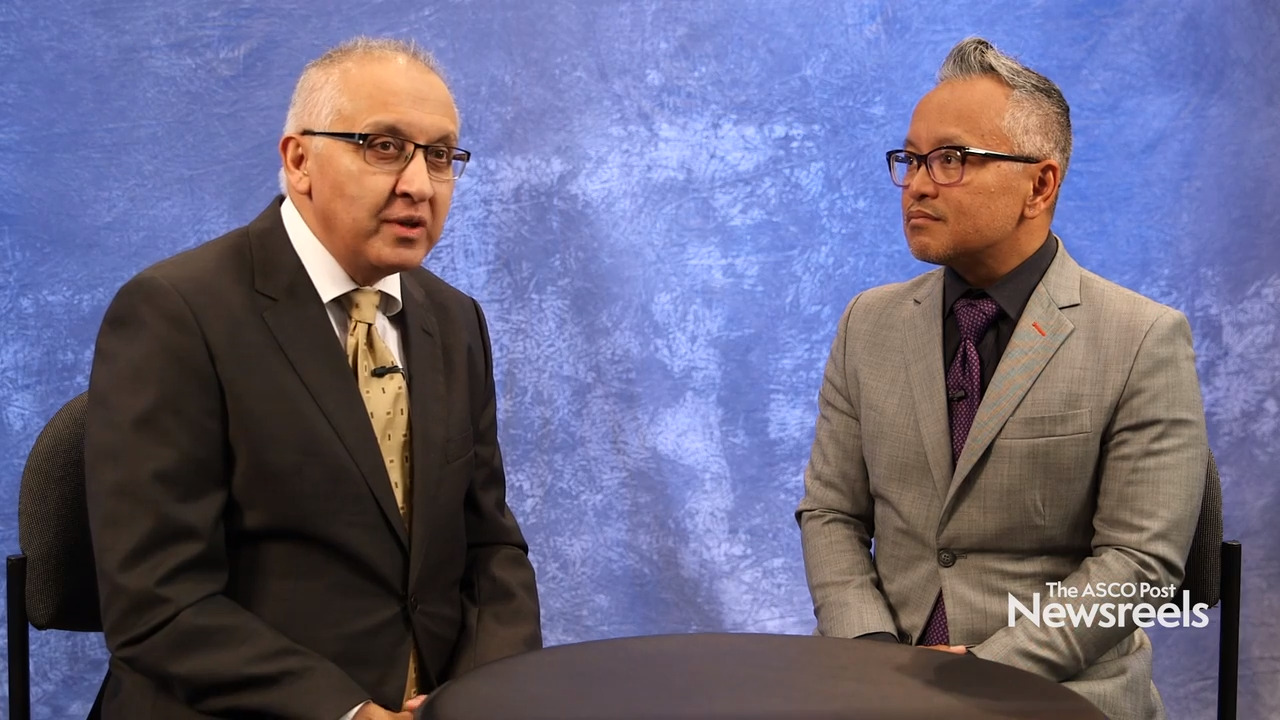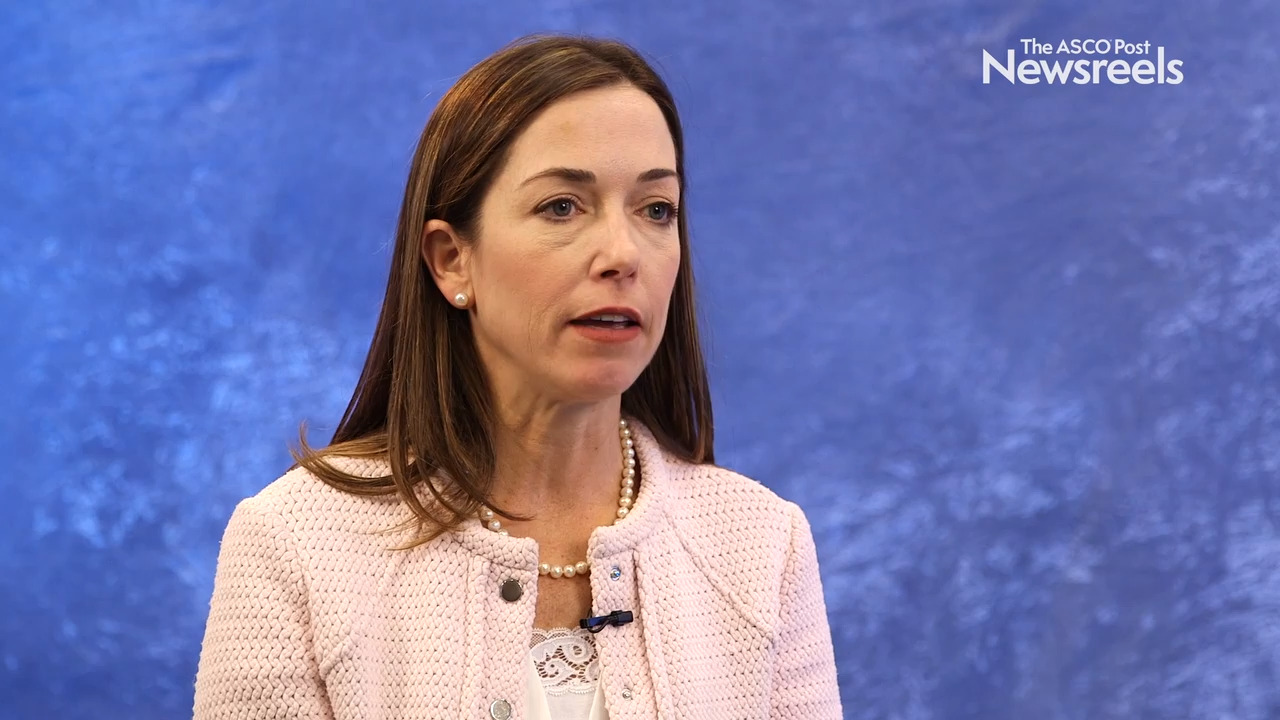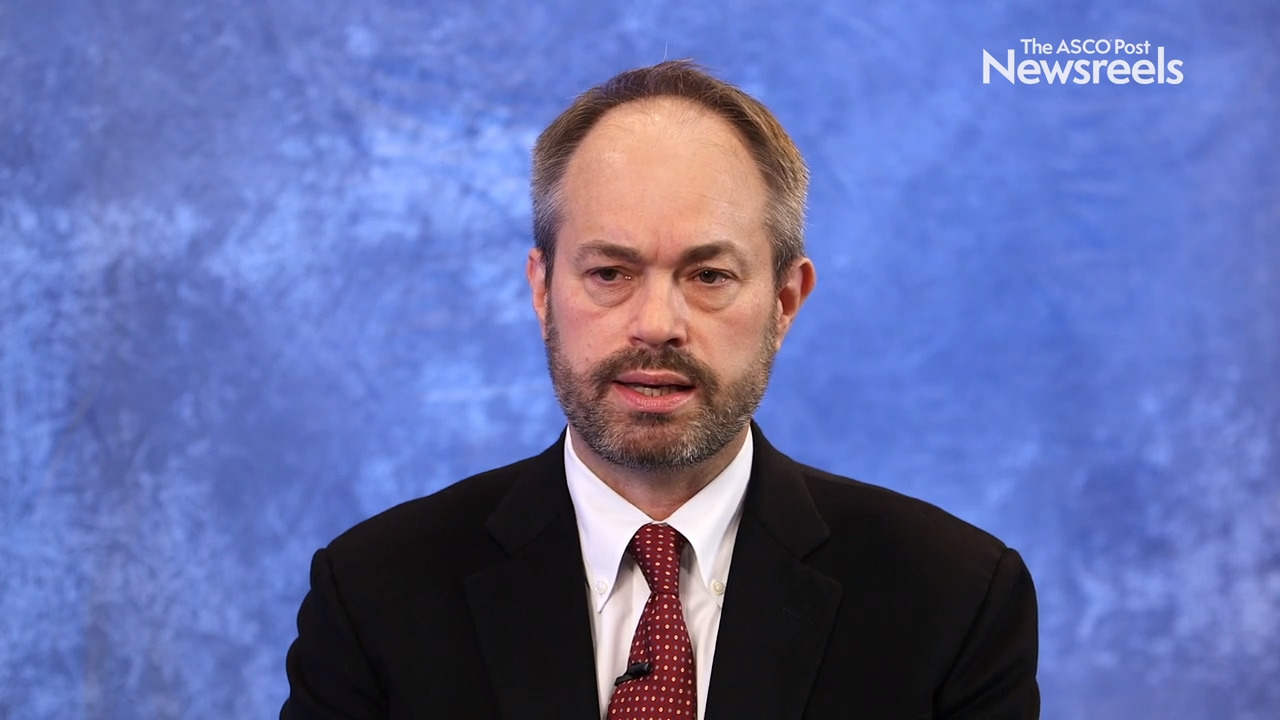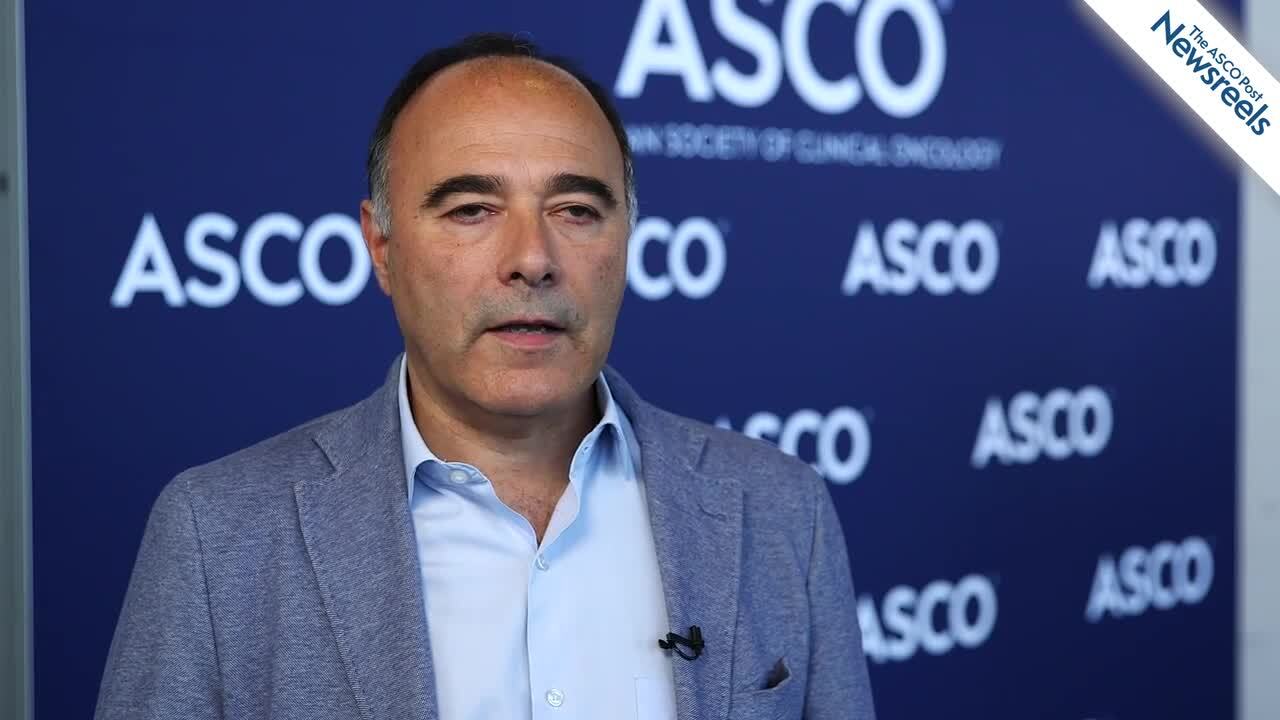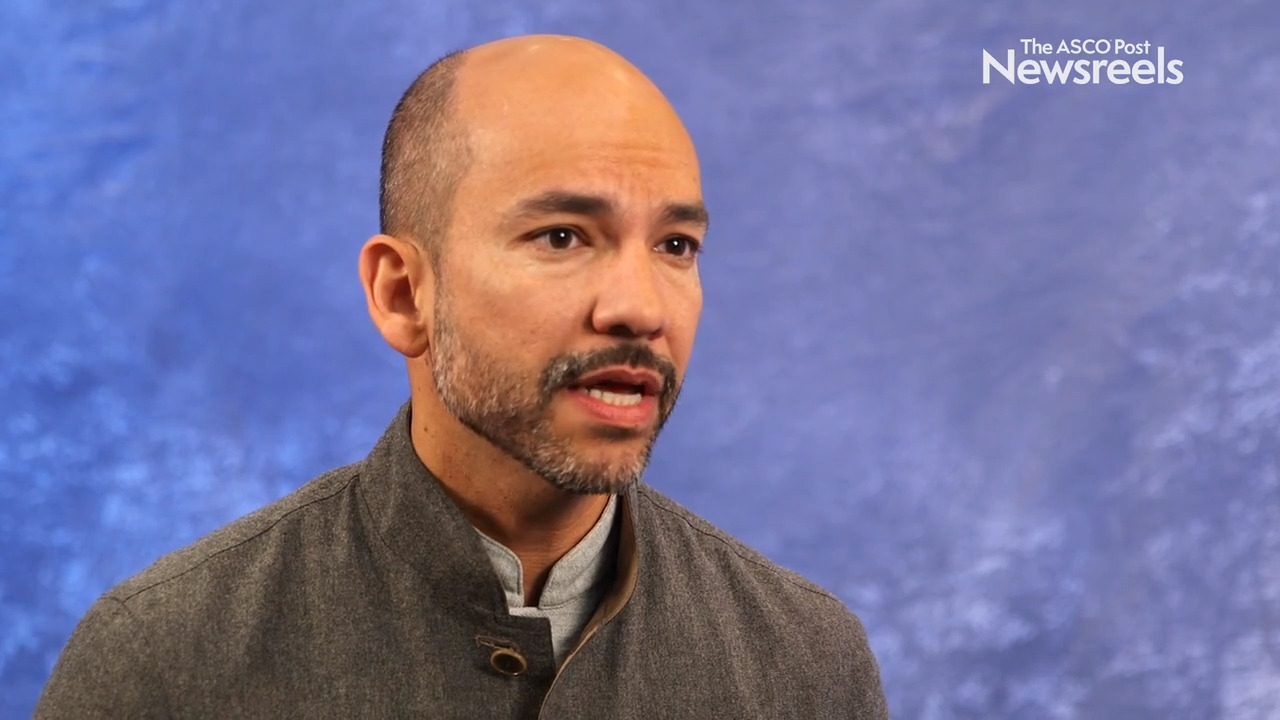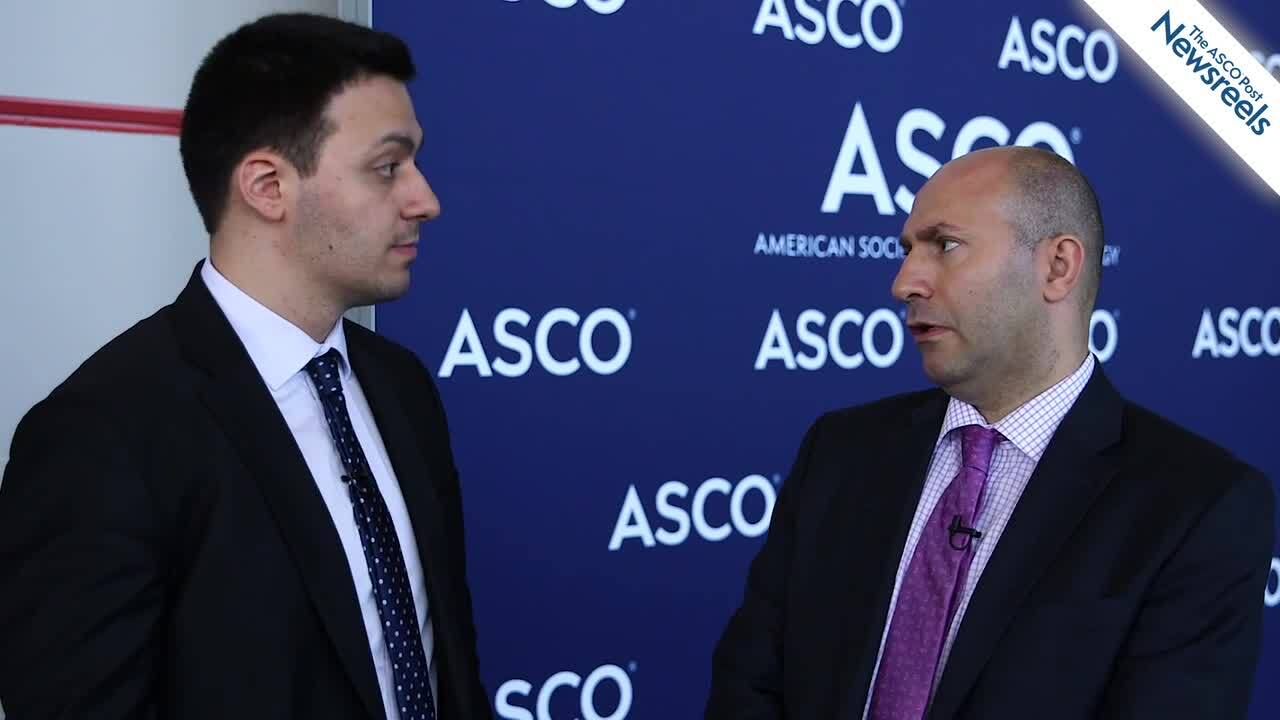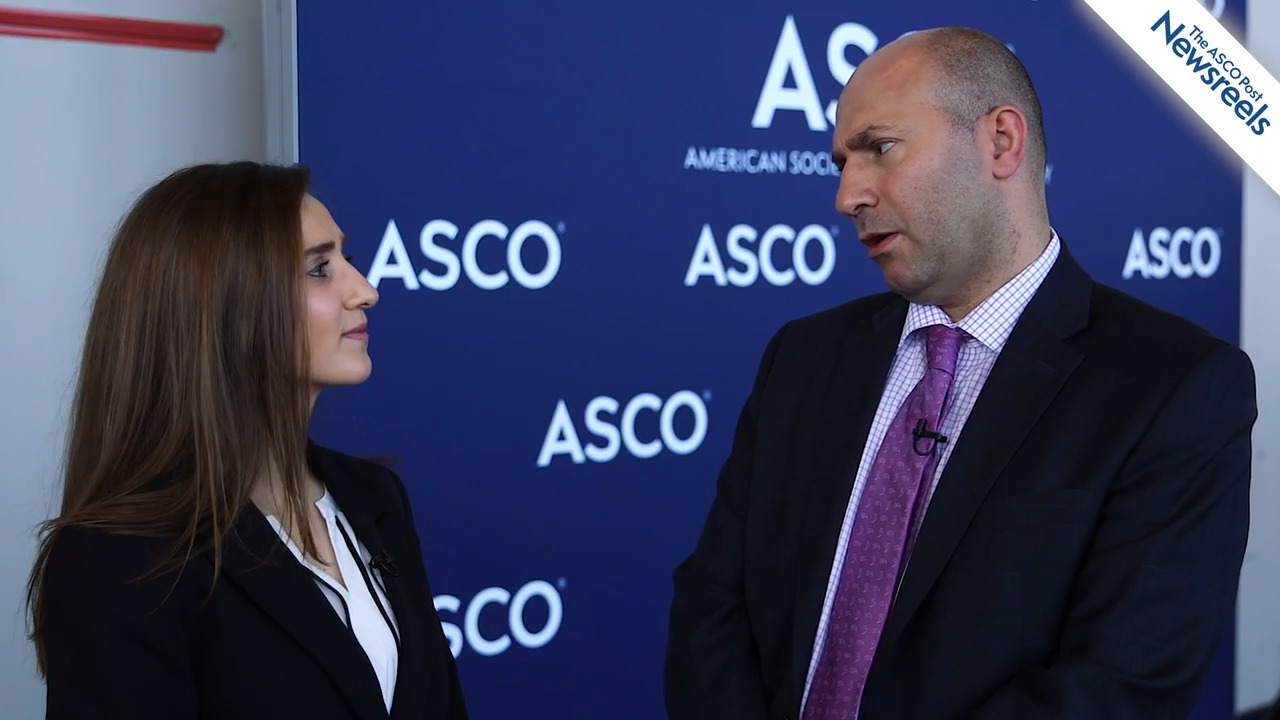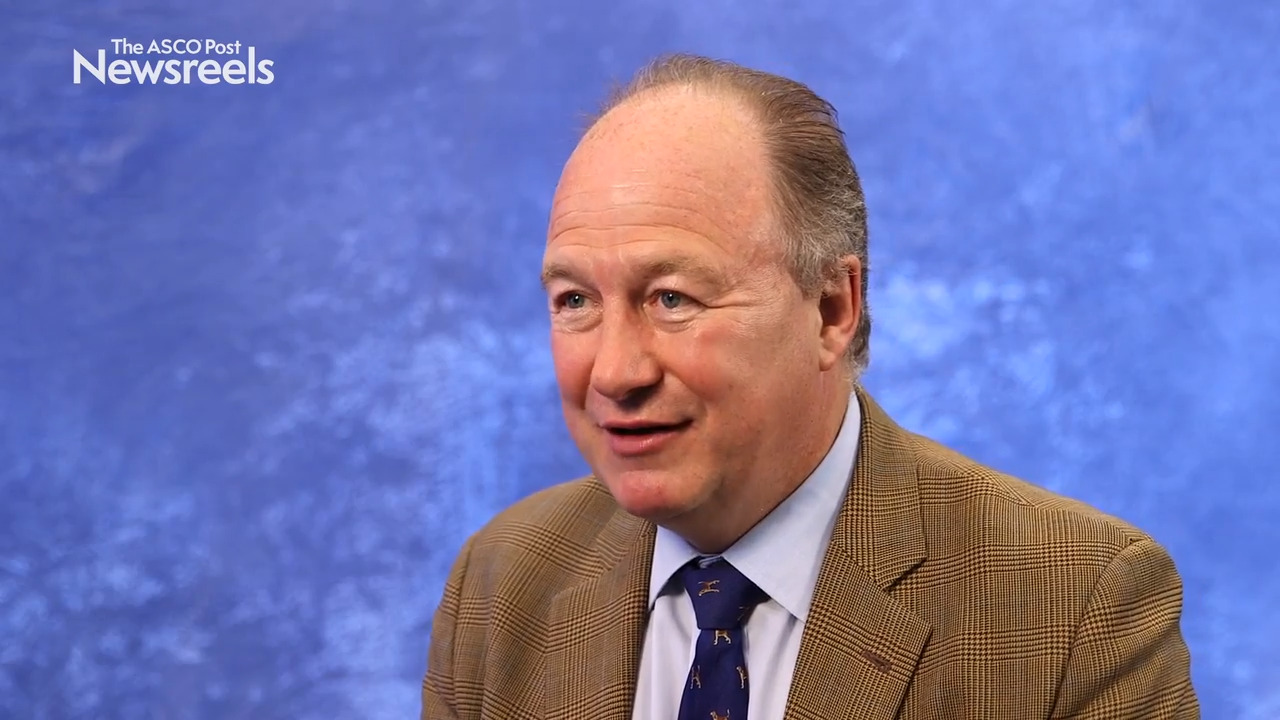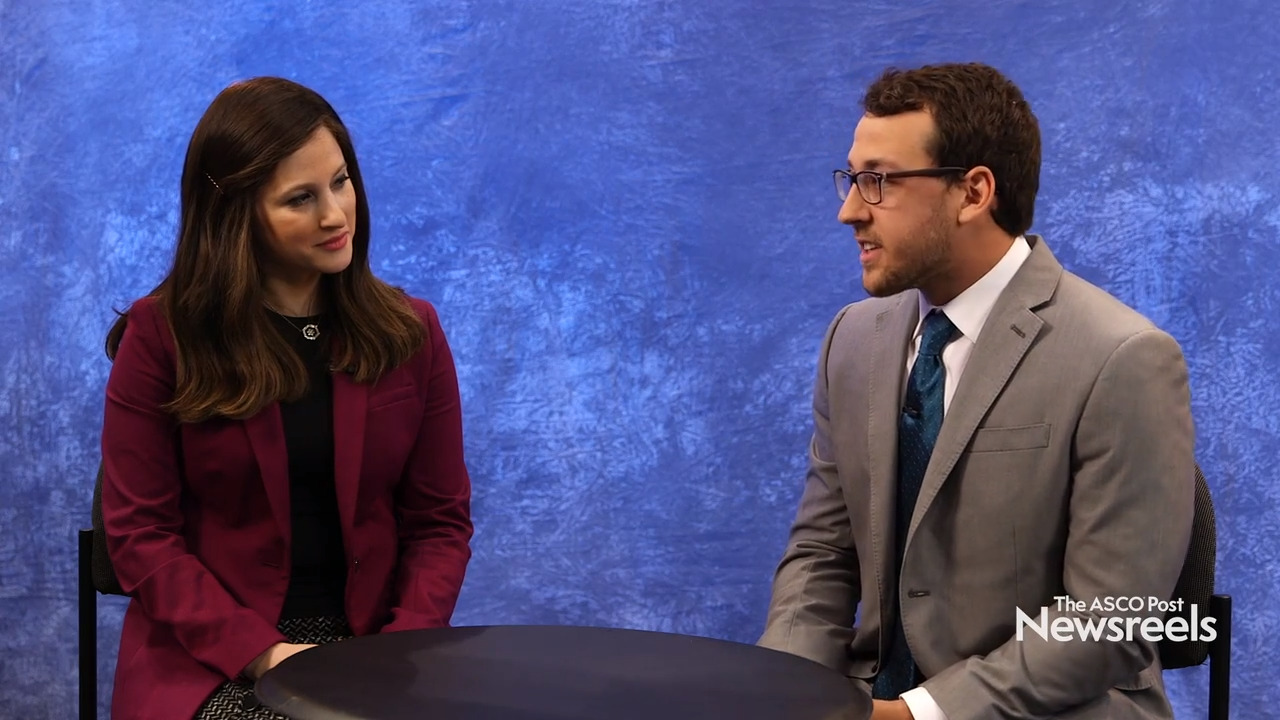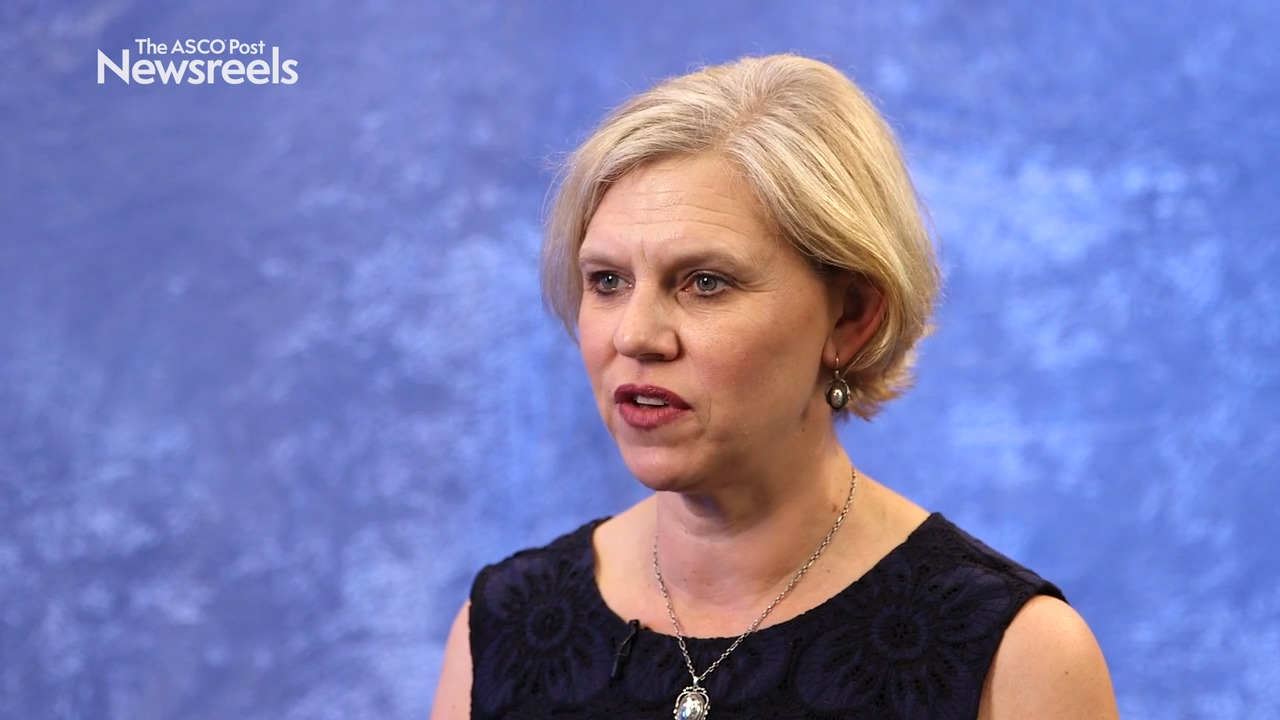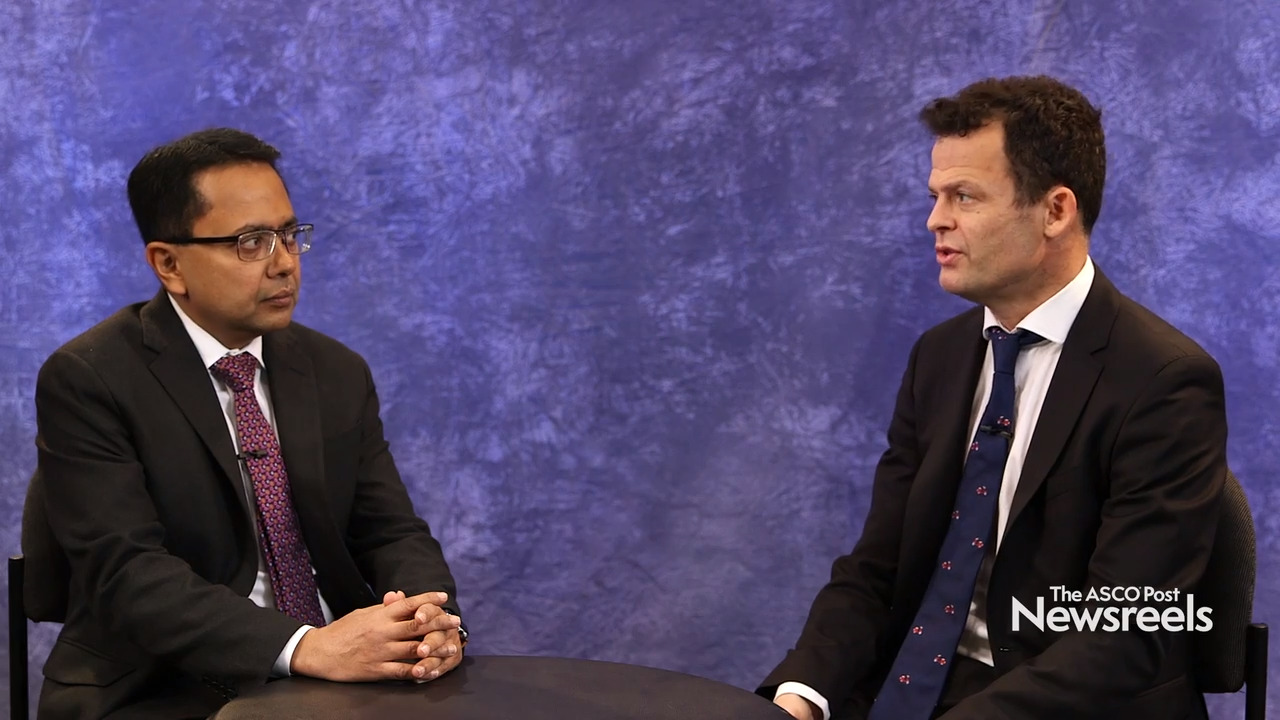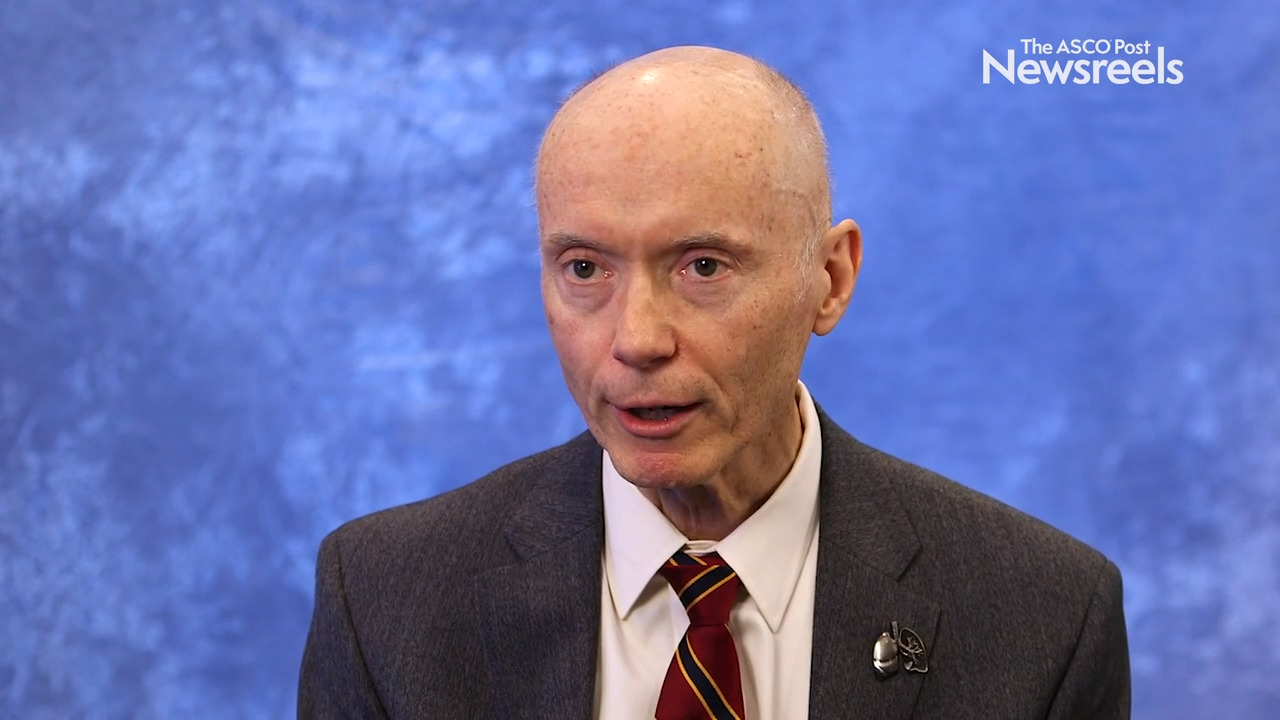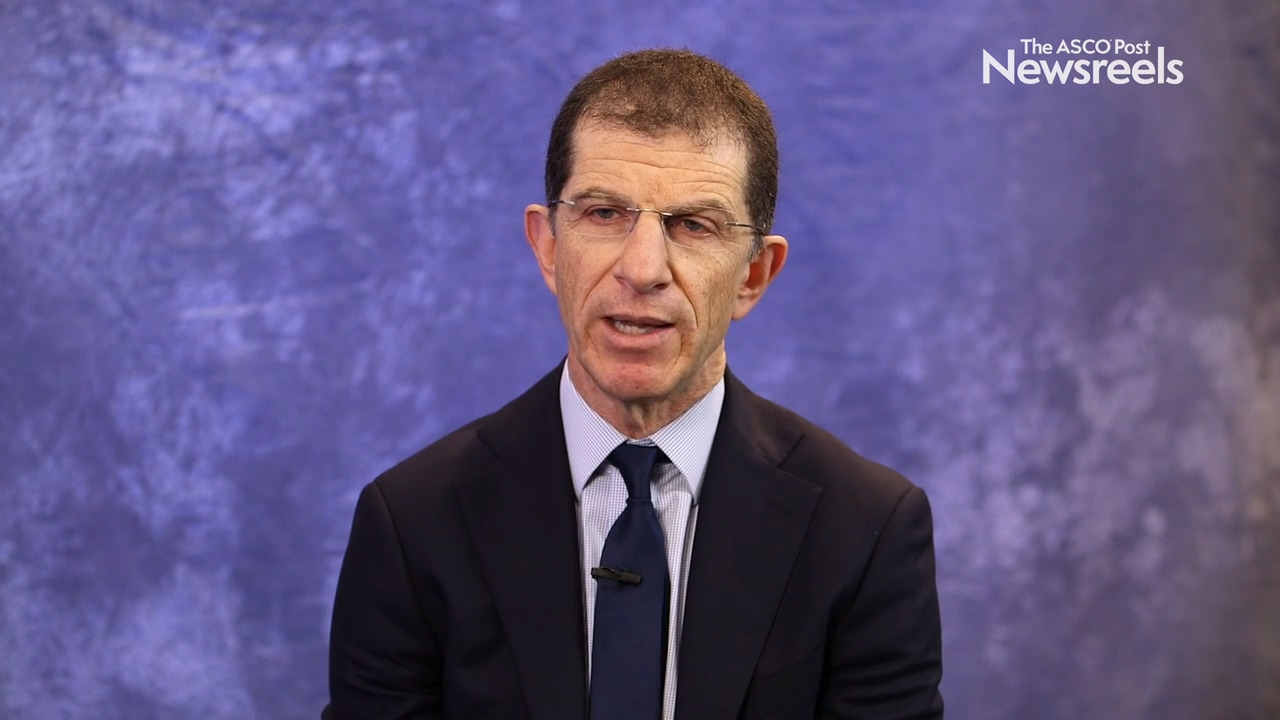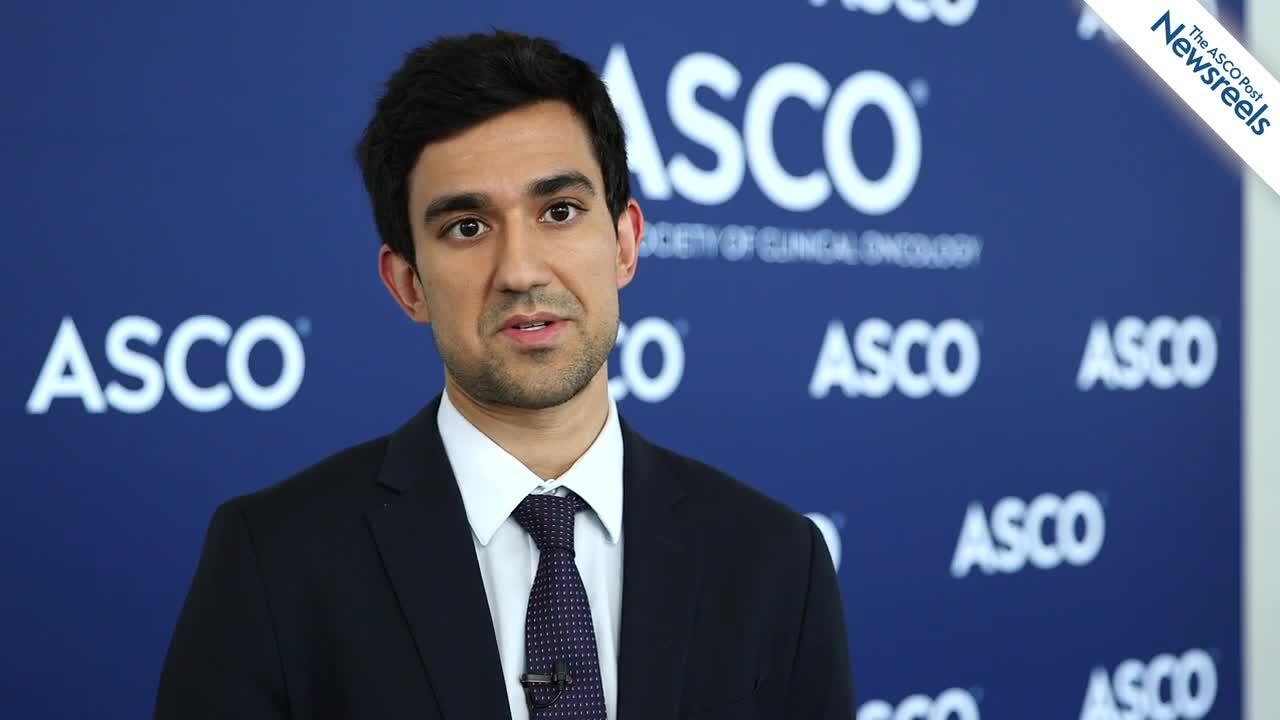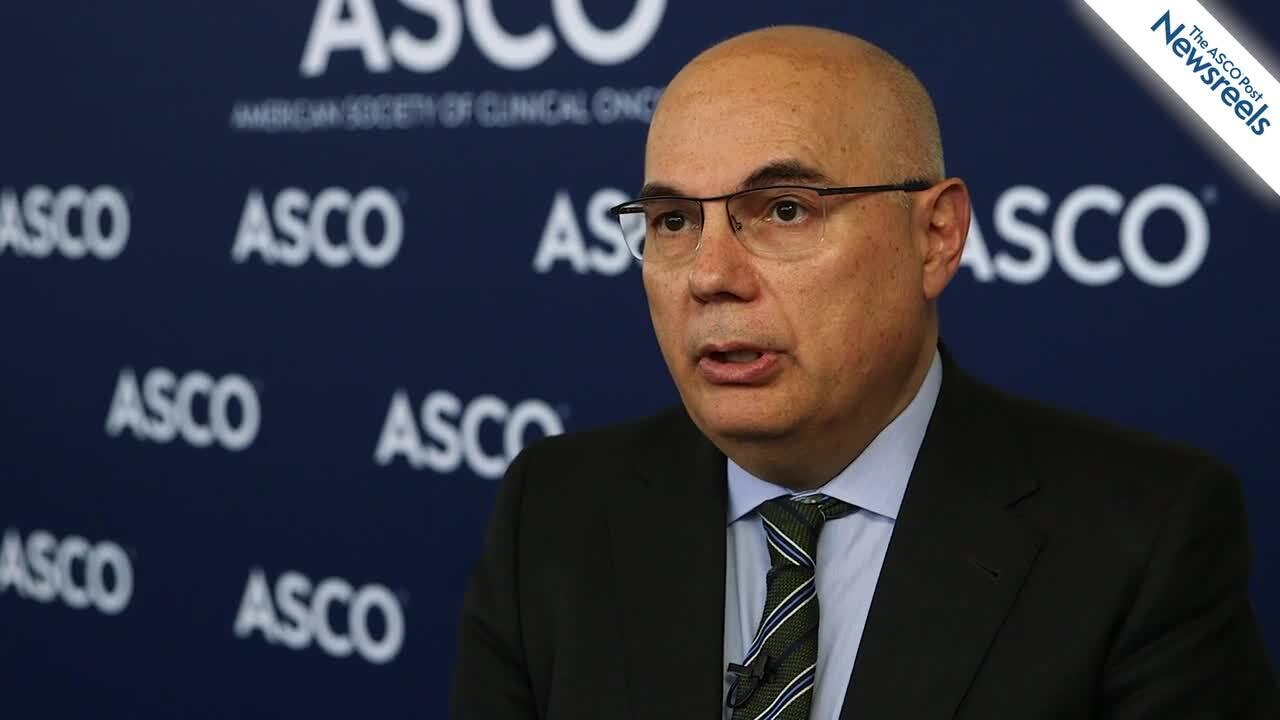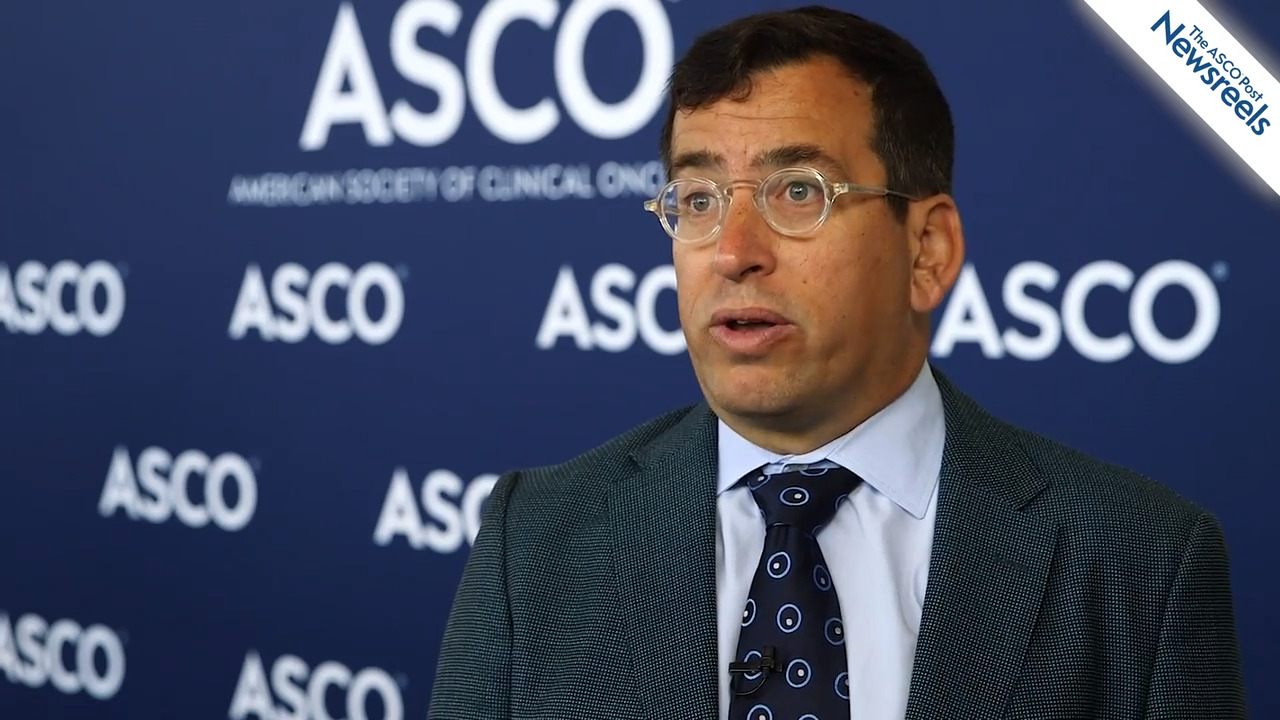Mansoor Raza Mirza, MD, and Don S. Dizon, MD, on Recurrent Platinum-Sensitive Ovarian Cancer: Niraparib Plus Bevacizumab
Don S. Dizon, MD, of the Lifespan Cancer Institute, and Mansoor Raza Mirza, MD, of Copenhagen University Hospital, discuss study findings that showed, compared with niraparib alone, niraparib plus bevacizumab improved progression-free survival in women with recurrent platinum-sensitive ovarian cancer (Abstract 5505).
Sara A. Hurvitz, MD, on HER2-Positive Breast Cancer: KRISTINE Trial on Neoadjuvant Trastuzumab, Pertuzumab, and Chemotherapy
Sara A. Hurvitz, MD, of the David Geffen School of Medicine, University of California Los Angeles, discusses 3-year outcomes from the first phase III study to test a non-conventional regimen for the neoadjuvant and adjuvant treatment of HER2-positive breast cancer (Abstract 500).
2019 ASCO: Combination Therapy With SurVaxM in Newly Diagnosed Glioblastoma
Ahluwalia et al shared research results on SurVaxM at the 2019 ASCO Annual Meeting, reporting that combination therapy with the immunotherapy vaccine was more effective than standard therapy for nearly all patients with newly diagnosed glioblastoma in a phase II trial (Abstract 2016). SurVaxM...
2019 ASCO: CLL14 Trial Evaluates First-Line Venetoclax/Obinutuzumab in Previously Untreated CLL
The phase III CLL14 trial—reported by Fischer et al at the 2019 ASCO Annual Meeting (Abstract 7502) and in The New England Journal of Medicine—found that the BCL2 inhibitor venetoclax plus the monoclonal antibody obinutuzumab prolonged progression-free survival vs obinutuzumab and...
CheckMate 205: Nivolumab in Newly Diagnosed, Advanced Classical Hodgkin Lymphoma
Findings in a cohort of the phase II CheckMate 205 study, reported in the Journal of Clinical Oncology by Ramchandren et al, indicate that nivolumab monotherapy followed by nivolumab plus doxorubicin, vinblastine, and dacarbazine (N-AVD) is highly active in newly diagnosed, advanced-stage classical ...
FDA Approves Pembrolizumab for the First-Line Treatment of Head and Neck Squamous Cell Carcinoma
On June 10, the U.S. Food and Drug Administration (FDA) approved the anti–programmed cell death protein 1 immunotherapy pembrolizumab (Keytruda) for the first-line treatment of patients with metastatic or unresectable recurrent head and neck squamous cell carcinoma. Pembrolizumab was...
FDA Approves Polatuzumab Vedotin-piiq in Combination With Bendamustine and a Rituximab Product for DLBCL
On June 10, the U.S. Food and Drug Administration (FDA) granted accelerated approval to polatuzumab vedotin-piiq (Polivy), a CD79b-directed antibody-drug conjugate, in combination with bendamustine and a rituximab product for adult patients with relapsed or refractory diffuse large B-cell lymphoma...
Cornelis J.M. Melief, MD, PhD, Honored With AACR-CRI Award in Cancer Immunology
The American Association for Cancer Research (AACR) has recognized Cornelis J.M. Melief, MD, PhD, with the seventh AACR–Cancer Research Institute (CRI) Lloyd J. Old Award in Cancer Immunology. Dr. Melief is Emeritus Professor at the Leiden University Medical Center in the Netherlands, as well as...
Adverse Events and Outcomes in Patients Receiving Anti–PD-1/PD-L1 Antibody Treatment for Advanced Urothelial Cancer
In an analysis reported in the Journal of Clinical Oncology, Maher et al found that treatment-related adverse events of special interest and immune-mediated adverse events were more common among patients with advanced urothelial cancer with vs without response to anti–programmed cell death...
FDA Pipeline: Reviews and Designations in Multiple Myeloma, Lymphoma, Prostate Cancer
Recently, the U.S. Food and Drug Administration (FDA) granted Priority Review for daratumumab in combination with a triplet therapy in multiple myeloma, Breakthrough Therapy designation to copanlisib for marginal zone lymphoma, and Fast Track designation for ARV-110 in metastatic...
2019 ASCO: NEOSTAR: Neoadjuvant Nivolumab Plus Ipilimumab in Early-Stage, Resectable NSCLC
Neoadjuvant treatment with nivolumab plus ipilimumab resulted in an overall major pathologic response rate of 33% of treated patients with early-stage, resectable non–small cell lung cancer (NSCLC). With these results, the combination immunotherapy met the prespecified trial...
Head and Neck Cancer Immunotherapy in Locally Advanced Disease: Clinical Trial Updates
Programmed cell death protein 1 (PD-1) inhibitors are approved for the second-line treatment of head and neck cancer and likely will be soon in the first-line treatment of locally advanced disease. According to Robert L. Ferris, MD, PhD, developments in immunotherapy for this population should be...
KEYNOTE-001 Shows Long-Term Survival Benefit With Pembrolizumab in Advanced NSCLC
Before the introduction of immunotherapy with checkpoint inhibitors, the 5-year life expectancy for patients with advanced non–small cell lung cancer (NSCLC) was 5.5%. This dismal outlook has changed. Treatment with the immune checkpoint inhibitor pembrolizumab dramatically improved overall...
2019 ASCO: Rituximab, Lenalidomide, and Ibrutinib Prior to Chemotherapy in DLBCL
Results of the phase II Smart Start trial revealed that combination targeted therapy consisting of rituximab, lenalidomide, and ibrutinib had an 84.6% overall response rate (ORR) and 38.5% complete response rate (CRR) when given prior to any chemotherapy for newly diagnosed patients with a...
Jason Westin, MD, on Diffuse Large B-Cell Lymphoma: Rituximab, Lenalidomide, and Ibrutinib Prior to Chemotherapy
Jason Westin, MD, of The University of Texas MD Anderson Cancer Center, discusses findings of the Smart Start study on the chemotherapy-free combination of rituximab, lenalidomide, and ibrutinib in newly diagnosed diffuse large B-cell lymphoma (Abstract 7508).
William G. Wierda, MD, PhD, on Immunotherapy for Relapsed/Refractory CLL/SLL: Results From TRANSCEND CLL 004
William G. Wierda, MD, PhD, of The University of Texas MD Anderson Cancer Center, discusses the TRANSCEND CLL 004 trial, which studied the use of an experimental CD19-directed CAR T-cell product in heavily pretreated patients with chronic lymphocytic leukemia or small lymphocytic lymphoma (Abstract 7501).
Ahmad A. Tarhini, MD, PhD, on High-Risk Melanoma: Adjuvant Ipilimumab vs High-Dose Interferon-α2b
Ahmad A. Tarhini, MD, PhD, of Emory University and Winship Cancer Institute, discusses phase III findings from the U.S. Intergroup E1609 trial, which showed survival benefits for patients with resected high-risk melanoma—for the first time in the history of melanoma adjuvant therapy (Abstract 9504).
IMpower130: Addition of First-Line Atezolizumab to Chemotherapy in Metastatic Nonsquamous NSCLC
As reported in The Lancet Oncology by West et al, the phase III IMpower130 trial found that the addition of atezolizumab to carboplatin plus nab-paclitaxel significantly improved overall and progression-free survival in first-line treatment of stage IV nonsquamous non–small cell lung cancer...
Javier Sastre, MD, PhD, on Colorectal Cancer: Bevacizumab and FOLFOXIRI in Metastatic Disease
Javier Sastre, MD, PhD, of Hospital Clinico San Carlos, discusses phase III findings on the assessment of circulating tumor cells as a prognostic factor and FOLFOXIRI plus bevacizumab combination outcomes for patients with poor-prognosis colorectal cancer (Abstract 3507).
William D. Tap, MD, on Soft-Tissue Sarcomas: ANNOUNCE Trial on Doxorubicin and Olaratumab
William D. Tap, MD, of Memorial Sloan Kettering Cancer Center, discusses negative study findings on doxorubicin plus olaratumab vs doxorubicin plus placebo, which showed no difference in overall survival between the two treatments in patients with advanced soft-tissue sarcomas. The manufacturer is currently withdrawing olaratumab from the global market (Abstract LBA3).
Gilberto Lopes, MD, MBA, on the RELAY Trial in Metastatic NSCLC: Erlotinib and Ramucirumab in EGFR Mutant–Positive Disease
Gilberto Lopes, MD, MBA, of the Sylvester Comprehensive Cancer Center at the University of Miami, offers commentary on phase III findings from the RELAY study, which showed that erlotinib plus ramucirumab led to superior progression-free survival in previously untreated patients with EGFR mutant–positive NSCLC (Abstract 9000).
Ziad Bakouny, MD, and Toni K. Choueiri, MD, on Renal Cell Carcinoma: Checkpoint Inhibitors and Genomic Characterization of Sarcomatoid/Rhabdoid Disease
Toni K. Choueiri, MD, and Ziad Bakouny, MD, both of Dana-Farber Cancer Institute, discuss a retrospective review of genomically profiled patients with sarcomatoid/rhabdoid renal cell cancer who were found to have better outcomes with immune checkpoint inhibitors and to harbor mutations associated with poor prognosis (Abstract 4514).
Sarah Abou Alaiwi, MD, and Toni K. Choueiri, MD, on Checkpoint Inhibitors: Overall Survival and Polybromo-Associated Mutations
Toni K. Choueiri, MD, and Sarah Abou Alaiwi, MD, both of Dana-Farber Cancer Institute, discuss the association of polybromo-associated BAF-type mutations with overall survival in patients with different solid tumors treated with checkpoint inhibitors (Abstract 103).
Paul G. Richardson, MD, on Relapsed or Refractory Multiple Myeloma: Adding Isatuximab to Pomalidomide and Low-Dose Dexamethasone
Paul G. Richardson, MD, of Dana-Farber Cancer Institute, discusses findings from the phase III ICARIA-MM trial showing that isatuximab, pomalidomide, and low-dose dexamethasone significantly improved progression-free survival and overall response vs pomalidomide and dexamethasone (Abstract 8004).
Miriam Knoll, MD, and Richard J. White, DO, on Non–Small Cell Lung Cancer: Predicting Radiotherapy/Immunotherapy Treatment Outcomes
Miriam Knoll, MD, of Hackensack University Medical Center, and Richard J. White, DO, of Allegheny Health Network, discuss improved overall survival among younger female patients with non–small cell lung cancer who have a lower comorbidity score, lower grade, private insurance, and treatment with intensity-modulated radiation therapy (Abstract 9024).
Yoland C. Antill, MD, on Endometrial Cancer: PHAEDRA Trial on Durvalumab and Mismatch Repair Status
Yoland C. Antill, MD, of Cabrini Health, discusses phase II data on the effect of durvalumab, a PD-L1 inhibitor, as a single agent in the setting of recurrent or advanced endometrial cancer. Her research compares the response in mismatch repair–deficient and –proficient tumors (Abstract 5501).
Suresh S. Ramalingam, MD, on Non–Small Cell Lung Cancer: Pemetrexed, Bevacizumab, or Both as Maintenance Therapy
Suresh S. Ramalingam, MD, of Winship Cancer Institute, Emory University, discusses findings from the ECOG-ACRIN 5508 study, which showed that single-agent bevacizumab or pemetrexed is the optimal maintenance therapy for advanced nonsquamous NSCLC (Abstract 9002).
Matt D. Galsky, MD, on Urothelial Cancer: Pembrolizumab vs Placebo After First-Line Chemotherapy
Matt D. Galsky, MD, of The Tisch Cancer Institute at Icahn School of Medicine at Mount Sinai, discusses phase II study findings that show switch maintenance with pembrolizumab significantly improves progression-free survival in the metastatic setting (Abstract 4504).
Jonathan E. Rosenberg, MD, on Urothelial Carcinoma: Adding Bevacizumab to Gemcitabine and Cisplatin
Jonathan E. Rosenberg, MD, of Memorial Sloan Kettering Cancer Center, discusses results from the phase III Alliance trial, which showed that adding bevacizumab to gemcitabine and cisplatin did not improve overall survival in patients with metastatic urothelial carcinoma, but did improve progression-free survival (Abstract 4503).
Neeraj Agarwal, MD, and Thomas Powles, MD, PhD, on Renal Cell Carcinoma: KEYNOTE-426 on First-Line Pembrolizumab Plus Axitinib vs Sunitinib
Neeraj Agarwal, MD, of Huntsman Cancer Institute, University of Utah Health Care, and Thomas Powles, MD, PhD, of Queen Mary University of London, discuss phase III study findings on outcomes with combination therapy for intermediate/poor-risk and sarcomatoid subgroups of renal cell carcinoma (Abstract 4500).
Daniel P. Petrylak, MD, on Urothelial Cancer: Enfortumab Vedotin Monotherapy for Locally Advanced or Metastatic Disease
Daniel P. Petrylak, MD, of Yale School of Medicine, discusses study results on enfortumab vedotin monotherapy for locally advanced or metastatic urothelial cancer previously treated with platinum and immune checkpoint inhibitors (Abstract LBA4505).
2019 ASCO: Enfortumab Vedotin Shows Activity in Previously Treated, Locally Advanced or Metastatic Urothelial Cancer
The single-arm, phase II EV-201 trial showed treatment with enfortumab vedotin—an agent targeting Nectin-4, a protein found in 97% of urothelial cancers—produced responses in 44% of patients with locally advanced or metastatic forms of urothelial cancer. Patients had previously been...
David J. Kwiatkowski, MD, PhD, on Non–Small Cell Lung Cancer: Neoadjuvant Immunotherapy for Resectable Disease
David J. Kwiatkowski, MD, PhD, of Brigham and Women’s Hospital and Dana-Farber Cancer Institute, discusses an interim analysis and biomarker data from a multicenter study showing that 19% of patients with NSCLC had a major pathologic response to preoperative treatment with atezolizumab (Abstract 8503).
Danny Rischin, MD, on Head and Neck Squamous Cell Carcinoma: KEYNOTE-048 Trial on Pembrolizumab
Danny Rischin, MD, of Peter MacCallum Cancer Centre, discusses phase III results that support pembrolizumab with and without platinum-based chemotherapy plus fluorouracil as new first-line standards of care for recurrent or metastatic head and neck squamous cell carcinoma (Abstract 6000).
Kamran A. Ahmed, MD, on Cervical Cancer: Stereotactic Body Radiation Therapy Plus Atezolizumab
Kamran A. Ahmed, MD, of the H. Lee Moffitt Cancer Center and Research Institute, reports on a trial in progress that is investigating whether treatment with atezolizumab plus hypofractionated radiation therapy will improve the objective response rate compared with atezolizumab alone in patients with recurrent, persistent, or metastatic cervical cancer (Abstract TPS5596).
Josep Tabernero, MD, PhD, on Advanced Gastric or Gastroesophageal Junction Adenocarcinoma: Pembrolizumab With or Without Chemotherapy vs Chemotherapy
Josep Tabernero, MD, PhD, of the Vall d’Hebron Institute of Oncology, discusses phase III findings of the KEYNOTE-062 study showing that, for some patients with advanced gastric or gastroesophageal junction cancer, pembrolizumab may improve survival and may be an effective alternative to chemotherapy, with fewer side effects (Abstract LBA4007).
Edward B. Garon, MD, on Advanced Non–Small Cell Lung Cancer: KEYNOTE-001 Trial on Pembrolizumab
Edward B. Garon, MD, of the David Geffen School of Medicine at the University of California, Los Angeles, discusses long-term survival data on patients with advanced non–small cell lung cancer treated with pembrolizumab and those with PD-L1 expressed in at least half of their tumor cells (Abstract LBA9015).
2019 ASCO: Novel Immunotherapy for Recurrent, Metastatic, or Persistent Cervical Cancer
There is a high, unmet need for effective treatments for patients with recurrent, metastatic, or persistent cervical cancer—most patients are young, and survival rates are poor. Adoptive cell transfer using tumor-infiltrating lymphocytes (TILs) has demonstrated durable responses in some...
2019 ASCO: KEYNOTE-062: Pembrolizumab With or Without Chemotherapy vs Chemotherapy in Advanced Gastric or GEJ Adenocarcinoma
The randomized, phase III KEYNOTE-062 trial achieved its primary endpoint, showing that for patients with programmed cell death ligand 1 (PD-L1)-positive, HER2-negative, advanced gastric or gastroesophageal junction (GEJ) cancer, initial therapy with pembrolizumab resulted in noninferior overall...
2019 ASCO: KEYNOTE-001: 5-Year Survival Data for Patients With Advanced NSCLC Treated With Pembrolizumab
Five-year data from the phase Ib KEYNOTE-001 trial showed that treatment with pembrolizumab was safe and effective and substantially increased overall survival in patients with advanced non–small cell lung cancer (NSCLC). Specifically, 23.2% of people who had not previously been treated with...
Lee S. Schwartzberg, MD, FACP: 2019 Update on the ACCC Immuno-Oncology Institute: Using Immunotherapy in the Community Setting
Lee S. Schwartzberg, MD, of the West Cancer Center, reports on this past year’s progress of the ACCC initiative to speed adoption of immunotherapeutics in community practices.
2019 ASCO: Final Analysis of KEYNOTE-048: First-Line Pembrolizumab for Recurrent or Metastatic Head and Neck Squamous Cell Carcinoma
The phase III KEYNOTE-048 trial is examining the efficacy of pembrolizumab alone, pembrolizumab/cisplatin or carboplatin/fluorouracil (5-FU), or cetuximab/cisplatin or carboplatin/5-FU as first-line therapy for recurrent or metastatic head and neck squamous cell carcinoma. At the second interim...
Addition of Bevacizumab to Carboplatin/Pemetrexed in Nonsquamous NSCLC
New research published by Bagley et al in JNCCN—Journal of the National Comprehensive Cancer Network used a large real-world data set to demonstrate a modest but consistent survival benefit associated with adding bevacizumab to carboplatin/pemetrexed in advanced nonsquamous non–small...
Polatuzumab Vedotin and Immunochemotherapy in Previously Untreated Diffuse Large B-Cell Lymphoma
As reported in The Lancet Oncology, Tilly et al found that the combination of polatuzumab vedotin, an antibody-drug conjugate targeting the CD79b component of the B-cell receptor, with immunochemotherapy showed high response rates in the phase II portion of a phase I/II study in previously...
CheckMate 032: Extended Follow-up of Nivolumab and Nivolumab/Ipilimumab Cohorts in Previously Treated Metastatic Urothelial Carcinoma
As reported in the Journal of Clinical Oncology by Sharma et al, follow-up of the cohort receiving nivolumab at 1 mg/kg plus ipilimumab at 3 mg/kg the phase I/II CheckMate 032 trial showed the regimen produced high levels of activity in platinum-treated, unresectable, locally advanced or metastatic ...
NCCN Roundtable Tackles Issues With Innovative Immunotherapies
Immunotherapies are radically changing outcomes, but while helping patients, they are creating complexities surrounding their cost. At the 2019 Annual Conference of the National Comprehensive Cancer Network® (NCCN®), a roundtable of experts, including clinicians and payers, discussed how chimeric...
IMmotion151: First-Line Atezolizumab/Bevacizumab vs Sunitinib in Metastatic Renal Cell Carcinoma
In the phase III IMmotion151 trial reported in The Lancet, Rini et al found that atezolizumab plus bevacizumab prolonged progression-free survival vs sunitinib in patients with previously untreated, programmed cell death ligand 1 (PD-L1)-positive, metastatic renal cell carcinoma. Study Details...
Early-Stage Study of Nivolumab Alone or in Combination With Cisplatin/Gemcitabine in Biliary Tract Cancer
In a Japanese phase I trial reported by Ueno et al in The Lancet Gastroenterology & Hepatology, researchers found nivolumab showed activity and had a manageable safety profile in patients with unresectable or recurrent biliary tract cancer. Methods The open-label phase I trial was conducted...
Lenvatinib Plus Pembrolizumab Shows Activity in Advanced Urothelial Cancer
THE COMBINATION of lenvatinib plus pembrolizumab has demonstrated antitumor activity in patients with advanced urothelial cancer, including patients receiving later-line treatment. Results of a phase Ib/II trial showed an objective response rate of 25% and a median progression-free survival of 5.4...
Front-Line Therapy in Advanced Renal Cell Carcinoma: Developing a New Standard
THE FRONT-LINE systemic treatment landscape for metastatic renal cell carcinoma has undergone tremendous movement over the past several years. A better understanding of the current management paradigm for therapy-naive patients warrants a reflection of historic landmark clinical trials that have...
